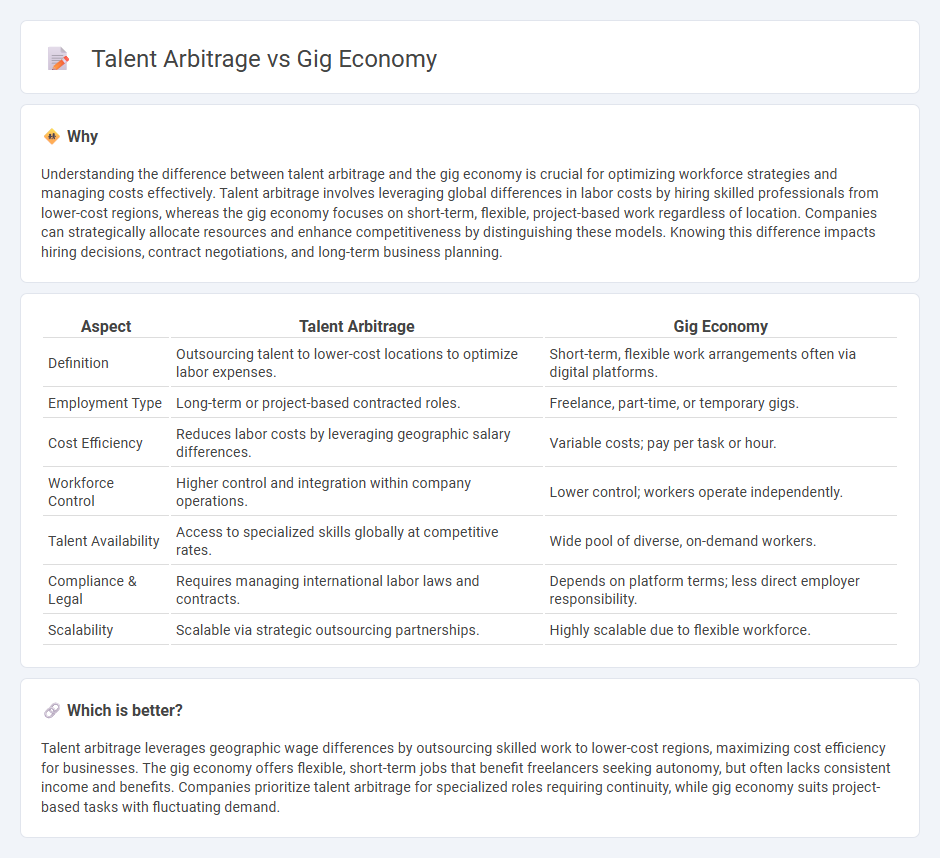
Talent arbitrage leverages global wage disparities by outsourcing skilled labor to regions with lower costs, optimizing company expenses while accessing diverse expertise. The gig economy focuses on flexible, short-term contracts or freelance work, empowering individuals to offer services on-demand through digital platforms. Explore the differences between talent arbitrage and the gig economy to understand how businesses and workers navigate modern employment landscapes.
Why it is important
Understanding the difference between talent arbitrage and the gig economy is crucial for optimizing workforce strategies and managing costs effectively. Talent arbitrage involves leveraging global differences in labor costs by hiring skilled professionals from lower-cost regions, whereas the gig economy focuses on short-term, flexible, project-based work regardless of location. Companies can strategically allocate resources and enhance competitiveness by distinguishing these models. Knowing this difference impacts hiring decisions, contract negotiations, and long-term business planning.
Comparison Table
| Aspect | Talent Arbitrage | Gig Economy |
|---|---|---|
| Definition | Outsourcing talent to lower-cost locations to optimize labor expenses. | Short-term, flexible work arrangements often via digital platforms. |
| Employment Type | Long-term or project-based contracted roles. | Freelance, part-time, or temporary gigs. |
| Cost Efficiency | Reduces labor costs by leveraging geographic salary differences. | Variable costs; pay per task or hour. |
| Workforce Control | Higher control and integration within company operations. | Lower control; workers operate independently. |
| Talent Availability | Access to specialized skills globally at competitive rates. | Wide pool of diverse, on-demand workers. |
| Compliance & Legal | Requires managing international labor laws and contracts. | Depends on platform terms; less direct employer responsibility. |
| Scalability | Scalable via strategic outsourcing partnerships. | Highly scalable due to flexible workforce. |
Which is better?
Talent arbitrage leverages geographic wage differences by outsourcing skilled work to lower-cost regions, maximizing cost efficiency for businesses. The gig economy offers flexible, short-term jobs that benefit freelancers seeking autonomy, but often lacks consistent income and benefits. Companies prioritize talent arbitrage for specialized roles requiring continuity, while gig economy suits project-based tasks with fluctuating demand.
Connection
Talent arbitrage leverages global wage disparities by outsourcing skilled work to regions with lower labor costs, which fuels the growth of the gig economy by creating more freelance and contract opportunities worldwide. The gig economy's flexible, project-based labor model aligns with talent arbitrage strategies, enabling companies to access specialized skills on-demand without long-term commitments. This synergy enhances workforce efficiency and cost-effectiveness while empowering talent across different geographic locations.
Key Terms
Flexibility
The gig economy offers unparalleled flexibility by allowing workers to choose projects and set their own schedules, which suits those seeking autonomy and varied work experiences. Talent arbitrage leverages geographical and economic differences to access specialized skills flexibly, enabling companies to optimize costs while meeting dynamic talent demands. Explore how these models transform workforce strategies and empower both individuals and businesses.
Labor Market Efficiency
Gig economy leverages flexible, short-term contracts to match supply and demand in real-time, enhancing labor market efficiency by reducing friction and idle time. Talent arbitrage exploits global wage disparities by outsourcing tasks to cheaper labor markets, optimizing cost-efficiency and resource allocation across borders. Explore deeper insights on how these models reshape workforce dynamics and drive economic optimization.
Cost Optimization
The gig economy leverages freelance and short-term contract workers to reduce labor costs and enhance operational flexibility, while talent arbitrage involves outsourcing skilled tasks to lower-cost regions to achieve significant savings. Cost optimization in the gig economy centers on variable work expenses and minimizing overhead, whereas talent arbitrage emphasizes wage differentials across geographical locations to maximize budget efficiency. Explore how businesses strategically balance these approaches to optimize workforce expenses.
Source and External Links
Gig Economy - Overview, Advantages, Disadvantages - The gig economy is a flexible system where labor and resources are exchanged through digital platforms, employing mostly independent contractors for temporary work without fixed schedules, leading to cheaper and more efficient services popular among younger demographics.
The Pros and Cons of the Gig Economy - The gig economy enables workers to take short-term jobs via online platforms, offering flexibility and autonomy, with over 70 million Americans freelancing and the market expected to grow from $556.7 billion in 2024 to $2.15 trillion by 2033.
What is the Gig Economy?| Definition from TechTarget - The gig economy is a free market system where temporary jobs and independent contractors are common, enabled by digital technology and workforce mobility, allowing global talent matching beyond geographic constraints.
 dowidth.com
dowidth.com